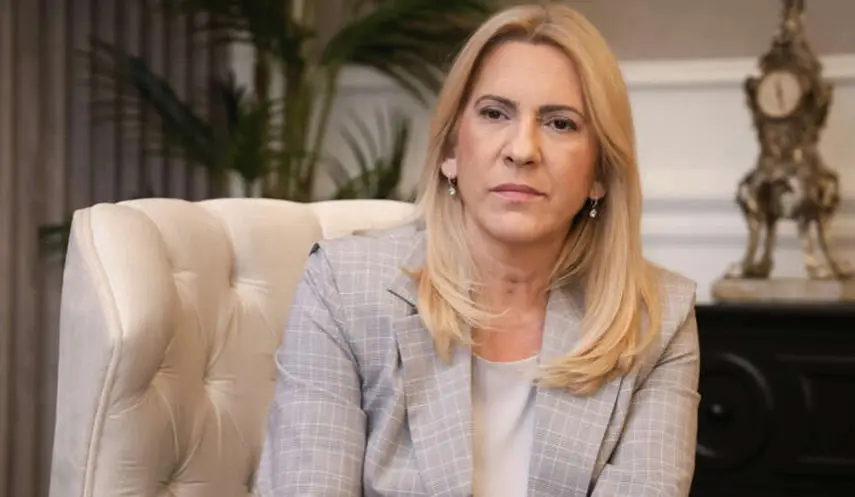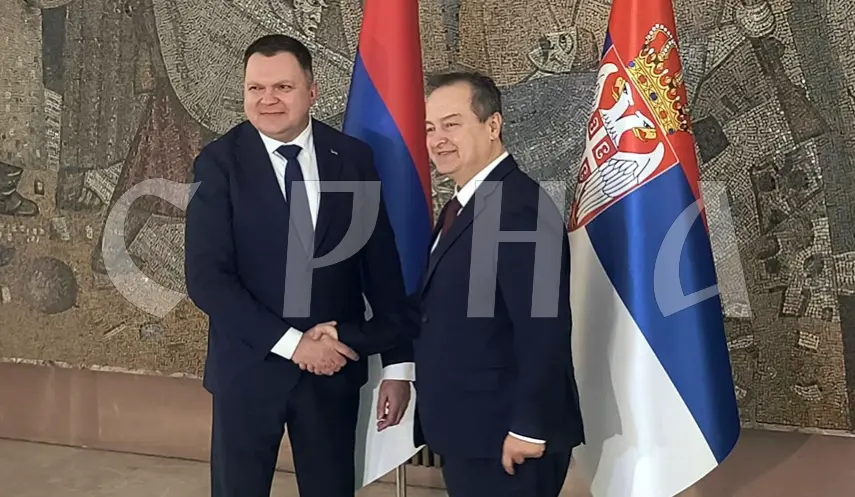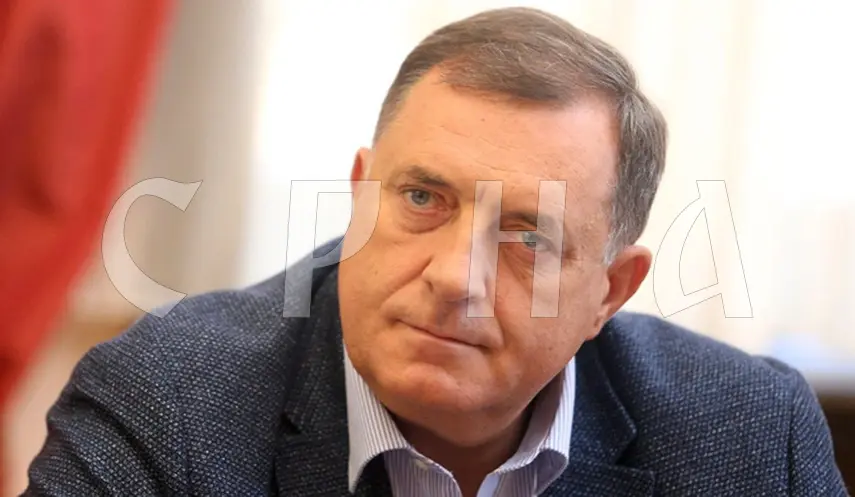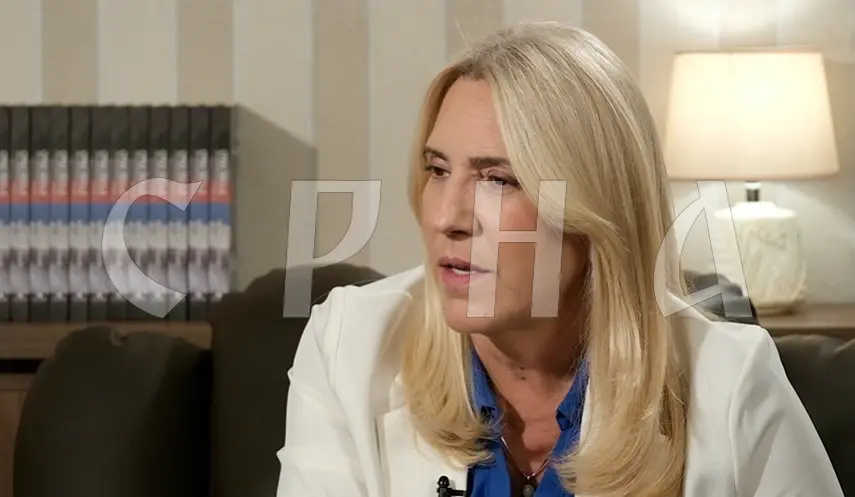THOMANN: PRESIDENT DODIK DEFENDS EUROPEAN NATION MODEL - HE IS NOT ALONE IN THAT; SCHMID’S MOVES AIMED AT SERBWORLD DIVISION
France - BiH
05/06/2025
14:54

PARIS, MAY 6 /SRNA/ - The decisions of the high representative for BiH continued to insist on the centralization of power in BiH from imposing various laws and decisions to the attempts to remove elected local officials who oppose this trend, such as the conviction of Republika Srpska President Milorad Dodik with the aim of denying Srpska's sovereignty and right to self-determination, assessed French researcher, lecturer and expert on geopolitics Pierre-Emmanuel Thomann.
SRNA published the text of the French expert on geopolitics, Pierre-Emmanuel Thomann, which was published on his website Eurocontinent, in its entirety:
The Court of BiH sentenced Milorad Dodik, the President of Republika Srpska /Srpska Republika of BiH/, to one year in prison and six years of ban from holding office in February 2025. This sentence followed an amendment to the criminal law imposed by the High Representative for BiH Christian Schmidt, a German citizen, in July 2023, which added the criminal offense of disobeying the decisions of the High Representative.
After Milorad Dodik rejected the authority of the High Representative for Bosnia and Herzegovina, because his appointment by the Peace Enforcement Council /PIC/ in Bosnia was not confirmed by the UN Security Council, as well as the appointment of his predecessors, this decision enabled the prosecutor’s office to file an indictment against President Dodik.
President Milorad Dodik is accusing the central authorities of BiH in Sarajevo, as well as the high representative, of violating the Dayton Peace Agreement, which provided for the federal structure of BiH and which was supposed to be balanced between the central authority and its entities.
As a reminder, since the Dayton Peace Agreement in 1995, which marked the end of the civil war, BiH has consisted of the "Croat-Muslim Federation" /capital Sarajevo/ and Republika Srpska /capital Banja Luka/, each with an army, parliament, government and constitution. The 1995 Dayton Peace Agreement guaranteed the entities, including Republika Srpska, legal provisions for greater autonomy in the police, education, judiciary and economy.
The Office of High Representative in BiH is an institution that was created by the same Dayton agreements and is responsible for facilitating the implementation of those agreements. Christian Schmidt was appointed by the PIC and therefore he was not elected, because the decision of the Security Council is missing. The Steering Board of the PIC, the executive body of the PIC, works under the chairmanship of the High Representative and gathers the members of the Steering Board.
Its members are representatives from the United States, Canada, the United Kingdom, France, Germany, Italy, Japan, Russia, the Presidency of the Council of the European Union, the European Commission and the Organisation of the Islamic Conference, which is represented by Turkey.
It reflects the different geopolitical interests behind the management of the protectorate, which is BiH. The President of Republika Srpska Milorad Dodik rejected this insulting sentence. He emphasized that he was not seeking secession, but called for the unity of the Serb people, urging them to gather around their institutions - parliament, government, law enforcement authorities - which he considers the pillars of stability and legitimacy of the entity.
Milorad Dodik is trying to promote dialogue with Croats in Bosnia in order to oppose the Muslim capital of Sarajevo, which is carrying out a project to spread political Islam in the country.
Behind these political and legal differences hide geopolitical issues concerning the power struggle between the great powers and the desire of the Euro-Atlantic authorities to deny sovereignty to Republika Srpska and its citizens, headed by Milorad Dodik, and to keep the Serb world geopolitically weak and fragmented.
The goal of NATO and the European Union, led by NATO, is to end the geopolitical fragmentation of the Balkans, which began with the destruction of Yugoslavia, with possible accession of BiH and /the southern Serbia's province of/ Kosovo to NATO and the EU.
The aim is to prevent any rapprochement between the entities of the Serb world, Serbia, Republika Srpska and Serb Kosovo, as well as to reduce political and historical ties between Serbs and Russians.
The geopolitical situation in the Balkans today is characterized by intricate configurations based on the strategy of triple encirclement in accordance with the geopolitical priorities of Washington and NATO.
As part of Washington's grand strategy to encircle Eurasia and turn Europe into a "Rimland" against Russia, the geopolitical strategy of encircling the Western Balkans at the European level and, ultimately, Serbia at the regional level from the Washington/Berlin/NATO/EU continuum is simultaneously being implemented.
Maintaining a single BiH also aims to definitively prevent any rapprochement between Republika Srpska and Serbia and, in synergy with the independence of Kosovo, prevent the possible unity of the Serb nation.
This German and American strategy of encircling Serbia is also intended to stop Russia's return to the Balkans. When the Washington/Berlin/NATO/EU continuum finalizes its policy of "Balkanization" of Yugoslavia, after the separation of Montenegro from Serbia in order to cut off its access to the sea, the ultimate goal will be the absorption of the various Western Balkans states into the EU and NATO.
The feasibility of this Euro-Atlantic plan, however, depends on the outcome of the crisis in Ukraine, which will determine the evolution of many unresolved geopolitical disputes in Europe.
The election of Donald Trump, changes and uncertainties in US foreign policy have made this plan even less likely. The Russian military intervention in Ukraine ended Euro-Atlantic expansion in Ukraine, whose territory is inexorably shrinking in favour of Russia.
This intervention also accelerated the evolution of the world order in favour of Russia towards a multipolar configuration, including Europe, especially in the Balkans, definitely calling into question the geopolitical order that resulted from NATO interventions in the former Yugoslavia.
Therefore, it is certain that the project of absorbing the Western Balkans into the Euro-Atlantic space will not only become more complicated, but that this space, as we already see, will once again become the main scene of conflict between Russia and the Washington/NATO/EU axis. In order to avoid the trending scenario of vertical and horizontal escalation of the conflict, which could spread from Ukraine to the Balkans, it would be wise to consider a systemic alternative to avoid this sudden surge, which is harmful to the entire Europe.
The exclusive Euro-Atlantic geopolitical order is indeed outdated for the promotion of a stable continental order at the European and Eurasian level.
With the conflict in Ukraine, it is clear that there will be no turning back, as the global geopolitical shift towards a multicentric world has definitely accelerated.
The expansion of NATO and the EU is now impossible in Russia's near abroad without the risk of a military escalation of the conflict, and it is increasingly uncertain in the Balkans as well. The EU and NATO will no longer be able to unilaterally and exclusively structure the spatial and geopolitical order of the European and Eurasian continent.
In order to stabilize Europe, there is no alternative but to abandon the doctrine of NATO and EU expansion and promote a more balanced and inclusive security for all nations on the European continent, including Russia and Serbia and the various entities of the Serb world.
It would be ideal to negotiate a new European geopolitical architecture, which would include not only Russia but also the Balkan states, especially Serbia, it would be more firmly based on the model of a Europe of sovereign nations and on the principle of geopolitical balance, as an alternative to a Europe integrated into the Euro-Atlantic area /NATO-EU/ excluding Russia.
Ultimately, it is also a matter of rediscovering the classical negotiations on European balances that introduced major successive spatial orders in Europe, from the Westphalian Treaties /1648/ to the Moscow Treaty /1990/, including the Congress of Vienna /1814-1815/, precarious and temporary, but preferable to growing military escalation.
France would benefit from regaining its position as a balancing power, inherited from General de Gaulle's vision. In this context, it would be in its interest to get closer to Russia, but also to the Serb world, in the perspective of this new European geopolitical architecture, as an alternative to integration into the exclusive Euro-Atlantic system in crisis, which exacerbates conflicts and limits France to the Euro-Atlantic periphery.
In this configuration, the stabilization of the Balkans requires a logical convergence of the various fragmented entities of the Serb world - Serbia, Republika Srpska and Serbs from Kosovo - entities that emerged from the old unipolar order after the destruction of Yugoslavia, according to the principle of self-determination.
In this context, the convicting judgment against President Milorad Dodik, who resists the centralization of BiH power, is a decision that not only worsens geopolitical cracks in BiH, but also reflects Euro-Atlantic geopolitical goals that belong to an outdated configuration.
President Milorad Dodik is not alone in his approach and has increasing political support in neighbouring countries, in Serbia and Hungary, but also in political parties in EU member states that defend the model - the Europe of Nations.

CVIJANOVIĆ: SDS SHOULD PARTICIPATE IN ELECTIONS AFTER COORDINATING WITH SCHMIDT AND NAMING A CANDIDATE

MOI LEGISLATION COOPERATION MEMORANDUM SIGNED

DODIK: UZUNOVIĆ'S DECISION IS SCANDALOUS, I PROPOSE A NATIONWIDE RALLY





